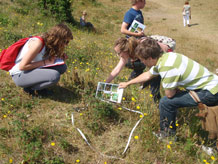
Pupils from Colyton Grammar School conduct field studies
University supports school science venture
The University of Exeter is supporting an innovative school science project, funded by the Royal Society, the UK’s national academy of science. Pupils from Colyton Grammar School in East Devon will study biodiversity in UK vineyards and report their findings on the Life in the Vines website hosted by the University of Exeter.
Aided by a Royal Society Partnership Grant, Life in the Vines will see pupils aged 16-18 take on the challenge of recording biodiversity on a weekly basis. Pupils will learn sampling techniques as well as developing advanced identification techniques. Data from this will be able to provide information regarding patterns of biodiversity within the vineyards as well as over time.
Dr Nicola King, Senior Teaching Fellow in Biosciences at the University of Exeter, is working in partnership with Colyton Grammar. Talking about why the University has become involved in the scheme, she said: “Our project will bring to life what pupils learn about in the classroom and help them to understand the impact of science and engineering upon their day-to-day activities. Making these subjects relevant is how we demonstrate how vital they are to our lives. These students will have the opportunity to find out first-hand how research scientists work and contribute to our understanding of local biodiversity.”
Miles Smith, Head of Biology at Colyton, and Dr Ian Stanbridge, Head of Science, said: “We are very lucky in having around 180 students studying A level Biology who are keen to be involved. This project gives the students a sense of ownership of some relevant and original research. It is great to have such strong links with Dr Nicola King and other experts from the University of Exeter who can mentor our students and provide role models for higher education and a career in science.”
The project offers young people the chance to meet and work with local scientists from the University of Exeter, viticulturists, conservation groups and professional ecologists, allowing them to build and develop their scientific understanding in a way that is exciting, original and relevant to their lives.
Professor John Pethica FRS, Vice-President of the Royal Society, said: “We’re pleased to be supporting Colyton Grammar School and are looking forward to seeing this imaginative project come to life over the coming months. Science and engineering are exhilarating and dynamic subjects and we hope that by giving teachers the opportunity to introduce innovative science that we can help show young people how much fun in real-life these subjects can be, and inspire them to become the inventors, explorers and innovators of the future.”
Ivan Jordan, RIBA, owner of the vineyard and a STEM ambassador, said: “As someone relatively new to viticulture, with a vineyard recently established, I have a great opportunity through this programme to assess the impact I am having on the biodiversity of our farmland, and make informed decisions about management of the vines for years to come. Because vines are susceptible to various maladies, they have traditionally been subjected to wholesale spraying and other methods of control which to my knowledge have not been monitored in this country for their affects on wildlife. I think the immediacy and accessibility of this study is a great way for someone like me to be informed how we affect the local ecology, and I hope from this to develop best practice that all English vineyards could draw from.”
Visit the Life in the Vines website.
Date: 27 June 2011
